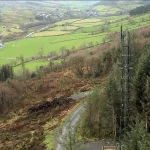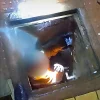BT Build’s First Quantum-Secured 500Gbps UK Fibre Optic Network
BT claims to have built the UK’s “first practical quantum-secured high-speed fibre network“, which harnesses quantum encryption and can transfer data at a speed of 500Gbps (Gigabits per second). The network runs over a distance of 120km via multiple exchanges between BT Labs in Ipswich and Cambridge University.
Quantum links are often said to be virtually “un-hackable” because they rely on the use of single particles of light (photons), to transmit data encryption ‘keys’ (Quantum Key Distribution) across the optical fibre. Should this communication be intercepted, the sender will be able to tell that the link has been tampered with and the stolen photons cannot then be used as part of the key, rendering the data stream incomprehensible to any hacker.
Admittedly this doesn’t stop hackers breaching the connection indirectly, such as by infiltrating the systems on either side of the link itself. Otherwise any data that passes over the link itself should remain secure and safe from prying eyes.
Advertisement
Professor Tim Whitley, BT’s MD of Research & Innovation, said:
“With the huge growth in cyber-attacks across the UK, it’s more important than ever before that we continue to develop ways to protect the most critical data.
BT has a long history of pioneering innovation so I’m delighted that we’re able to announce this major breakthrough in the field of quantum communications. This is a brilliant example of how academia and business can work together to develop ultra-secure networks to give us the confidence we need in our future digital economy.”
The new network, which forms part of a collaborative project led by the Quantum Communications Hub (part of the UK National Quantum Technologies Programme), was constructed by researchers from BT, the University of York and the University of Cambridge over the past two years.
According to BT, the work was co-funded by the Engineering and Physical Sciences Research Council (EPSRC) and will connect to the Cambridge Metropolitan QKD Network being launched tomorrow in Cambridge. In the future it’s hoped that such networks could be deployed to help secure critical national infrastructure, as well as to protect the transfer of sensitive medical and financial information etc.
The partners are using equipment from ID Quantique to transmit the data encryption key using a stream of single photons across the fibre network. In parallel, the encrypted data flows through the same fibre, powered by equipment from ADVA optical networks. The fibre runs from Cambridge University Engineering Department’s Centre for Photonic Systems via quantum ‘repeater stations’ at Bury St Edmunds and Newmarket before making its way to the BT Labs.
Obviously this is aimed more at major national or even international connections rather than domestic broadband ISP links.
Advertisement
Mark is a professional technology writer, IT consultant and computer engineer from Dorset (England), he also founded ISPreview in 1999 and enjoys analysing the latest telecoms and broadband developments. Find me on X (Twitter), Mastodon, Facebook, BlueSky, Threads.net and Linkedin.
« Virgin Media Launch Special Broadband Deals for UK Students
UK Network Operator and ISP CableCom Rebrands to Glide »

















































Comments are closed